|
|
|
Sort Order |
|
|
|
Items / Page
|
|
|
|
|
|
|
| Srl | Item |
| 1 |
ID:
121682


|
|
|
|
|
| Publication |
2012.
|
| Summary/Abstract |
I
n the years since improvised explosive devices (IEDs) became symbols of asymmetric warfare and modern military conflict, very little has changed in the
realm of counter-improvised explosive device (C-IED) strategy. The military
is always searching for better vehicles and equipment to defeat what is, at its core, a
homemade device made for a fraction of the cost of our technological countermeasures. As a result, C-IED strategy has primarily focused on developing new ways to
mitigate the effects of an IED blast rather than trying to prevent it from occurring.
Billions of dollars have been spent in the name of saving lives, yet the true cause
of the problem and its origins remain largely ignored, leaving out the crucial role
played by population-centric counterinsurgency operations.
|
|
|
|
|
|
|
|
|
|
|
|
|
|
|
|
| 2 |
ID:
151983
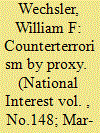

|
|
|
|
|
| Summary/Abstract |
ONE OF the few things that Presidents George W. Bush and Barack Obama have in common is that they reversed their long-standing approaches to counterterrorism during their very last years in office. They initially held diametrically opposed military policies, with Bush choosing invasion and occupation and Obama preferring disengagement and drone strikes. But by the end of their second terms they had both ended up in roughly the same place, with a central focus on indirect action—enabling local forces to achieve U.S. counterterrorism objectives.
|
|
|
|
|
|
|
|
|
|
|
|
|
|
|
|
| 3 |
ID:
129935


|
|
|
|
|
| Publication |
2014.
|
| Summary/Abstract |
Kelechi Johnmary Ani and Jude O Chukwu give a synoptic review of the historical and sociopolitical environment of Nigerian defence and national security operations and show how these have been characterised by bottlenecks and societal challenges, some of which have been institutional and others systemic. They also point out factors that determine and promote sound civil-military relations, which are vital for confl ict resolution, especially in counterinsurgency operations.
|
|
|
|
|
|
|
|
|
|
|
|
|
|
|
|
| 4 |
ID:
158826


|
|
|
|
|
| Summary/Abstract |
This article looks at the essential conditions for a durable peace in Kashmir and argues that the Valley has been most peaceful only during an active, on-going peace process. The lack of effective and continuous engagement with key stakeholders, especially the people of Jammu and Kashmir (J&K), has fostered a sense of deep alienation and enduring distrust. It further argues that counterinsurgency operations need to be simultaneously augmented by an active peace process engaging all stakeholders. This would mean a dialogue between the Centre and the J&K and Mainstream and Separatist parties as well as between the different regions of the state. The different political attitude in the Valley, Jammu and Ladakh can serve as a roadblock to a lasting peace if a dialogue is not underway. It recommends urgent steps that must be taken to regain the confidence of people and move closer towards resolution of the conflict.
|
|
|
|
|
|
|
|
|
|
|
|
|
|
|
|
| 5 |
ID:
118322
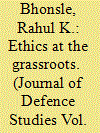

|
|
|
|
|
| Publication |
2013.
|
| Summary/Abstract |
This article addresses the declining standards of morality in the armed forces and suggests measures to address it by undertaking appropriate interventions at the grassroots, unit or battalion. It traces the importance of ethics in the military, particularly in the context of the post-modern state, which grants exclusive authority to the armed forces for the use of violence. Further, it examines the state of ethics today and the challenges in codification to arrive at the basic ethical norms that need to be fostered in the military. Having established this, the article goes on to highlight the context of ethics at the unit level, outlining the challenges faced, including in counter-insurgency operations, normal administrative functioning, and the current approach to ethics training. The author proposes three options as suggestions for building an ethical culture in the unit-the Kohlberg model, the Values and Virtues Approach, and a Code of Conduct.
|
|
|
|
|
|
|
|
|
|
|
|
|
|
|
|
| 6 |
ID:
129244
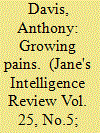

|
|
|
| 7 |
ID:
122295


|
|
|
|
|
| Publication |
2013.
|
| Summary/Abstract |
This article expands our understanding of how states respond militarily to threats and challenges by examining how organizational culture and institutional policymaking structures shape states' use of force. To evaluate the explanatory power of culture and institutions, I analyze the effect of each variable on how the United Kingdom and France conduct counterinsurgency operations. To preview the conclusions, although both organizational culture and institutional structures provide insights into how states fight insurgencies, institutional structures are much more decisive in shaping outcomes. In states where policymaking institutions promote maximal political control of the armed forces, the result will be strategic satisficing, whereby restricted force is surgically employed, along with diplomacy, to achieve the state's limited goals while minimizing the risks of casualties and/or escalation. Contrarily, in states where institutions accord operational autonomy to the armed forces, commanders will pursue their preference for decisive military victory by applying overwhelming force and conducting operations that risk escalating conflicts. In contrast to institutions, organizational culture plays a more modest role, limited to shaping how military leaders initially conceptualize the challenges they face and the techniques they employ at the tactical level. Thus, institutional structures, rather than organizational culture, offer a more convincing argument for why similar states, facing comparable challenges, use force in systematically different ways.
|
|
|
|
|
|
|
|
|
|
|
|
|
|
|
|
| 8 |
ID:
075299
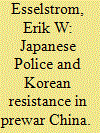

|
|
|
|
|
| Publication |
2006.
|
| Summary/Abstract |
Based on the records of Japanese Foreign Ministry police forces, this article describes a failed attempt by Japanese consular police in south Manchuria during the early 1920s to suppress the Korean independence movement in exile through the employment of local collaborators. Implemented because the Chinese government did not recognize the legal legitimacy of Japanese consular police operations on Chinese soil, this counter-insurgency program reveals the lengths to which Japanese consular authorities were willing to go in the search for solutions to their perceived national security threats in Northeast Asia long before the outbreak of full-scale war with China in the 1930s.
|
|
|
|
|
|
|
|
|
|
|
|
|
|
|
|
| 9 |
ID:
126096
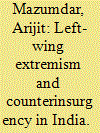

|
|
|
|
|
| Publication |
2013.
|
| Summary/Abstract |
India has a long history of left-wing extremism. The largest and most powerful left-wing extremist group today is the Communist Party of India (CPI) (Maoist), which is active in many states across the country. Its ultimate goal is to capture power through a combination of armed insurgency and mass mobilisation. In recent times, the southern state of Andhra Pradesh has achieved notable success in counterinsurgency operations against the Maoists. This article outlines the 'Andhra model', which involves a mix of security, development and political approaches. It also examines whether this model can be replicated in other Indian states affected by left-wing extremism.
|
|
|
|
|
|
|
|
|
|
|
|
|
|
|
|
| 10 |
ID:
107645
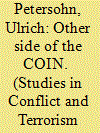

|
|
|
|
|
| Publication |
2011.
|
| Summary/Abstract |
The Iraq War was a watershed regarding the scope of battlefield support by Private Security Companies (PSC). Skeptics soon raised concerns about these new actors being an impediment to the success of the very same operations they are meant to support. According to the critics, PSCs are grist to the mill for insurgents as they employ aggressive tactics and thereby alienate the population, cause credibility problems because they enjoy impunity, and increase coordination problems since they are not subordinated under the military chain of command. This article argues that this is not a necessary result of their employment, but rather the consequence of a lack of preparedness to operate alongside PSCs. However, the military is accustomed to adapting to new unexpected circumstances. Hence, when problems occurred, the armed forces underwent a trial and error learning process that improved PSC employment. The empirical picture supports this view. Initially, the counterinsurgency effort did indeed suffer from the actions, lack of oversight, and lack of coordination of PSCs. However, over the course of the Iraq War, most of the shortfalls were either improved significantly or even resolved.
|
|
|
|
|
|
|
|
|
|
|
|
|
|
|
|
| 11 |
ID:
150159


|
|
|
| 12 |
ID:
127101
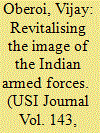

|
|
|
| 13 |
ID:
002879
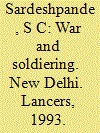

|
|
|
|
|
| Publication |
New Delhi, Lancers, 1993.
|
| Description |
vii, 192p.
|
| Standard Number |
1897829000
|
|
|
|
|
|
|
|
|
|
|
|
Copies: C:3/I:0,R:0,Q:0
Circulation
| Accession# | Call# | Current Location | Status | Policy | Location |
| 034335 | 355.3/SAR 034335 | Main | On Shelf | General | |
| 034474 | 355.3/SAR 034474 | Main | On Shelf | General | |
| 034475 | 355.3/SAR 034475 | Main | On Shelf | General | |
|
|
|
|
| 14 |
ID:
130308
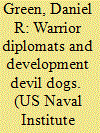

|
|
|
|
|
|
|
|